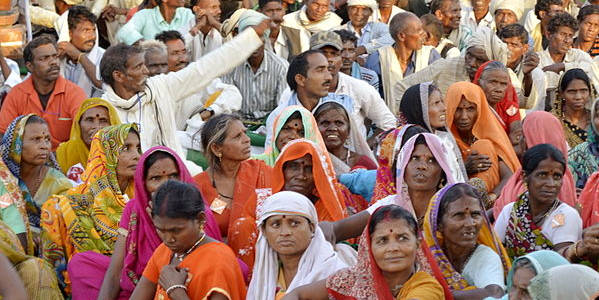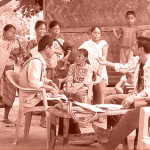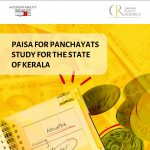
Social Audits: The Indian Experience
20 April 2018
Social audits have been adapted very organically into the implementation process of a number of schemes in India. This blog explores why and how citizens can use social audits as a monitoring tool for government schemes and programmes.
What is a social audit?
In the context of government schemes, a social audit is an accountability tool that measures, evaluates, identifies gaps in service delivery and elicits promises to rectify these gaps with the direct participation of intended beneficiaries in this process. In its essence, social auditing is a monitoring tool that empowers citizens to not only keep a track of utilisation of funds but most importantly gauge the effectiveness of a scheme by looking at its impact, whether the scheme has been beneficial for its target audience and allows an organisation to evaluate the sustainable roll out of a scheme.
The word ‘audit’ is derived from the Latin term ‘audire’ which means ‘to hear’. True to its etymology, a very important component of a social audit is the public hearing that follows the evaluation process, where informed citizens raise concerns that are addressed in real time by the concerned authority figures with promises of immediate rectification.
The process of social auditing of government schemes is fairly straightforward. For instance, under the National Rural Employment Guarantee Act, 2005 (MGNREGA) which enshrined social audits in the Act, the first step is to gather all the records regarding the scheme such as muster rolls, maintained by the administration are collected and pored over. Based on these readings, surveys are prepared and social auditors administer the surveys across the geographical area of the audit and also conduct spot inspections.
During the survey, awareness about the scheme is also generated, letting the recipients themselves bridge the gap between what the scheme offered and what they actually got (which might throw up glaring disparities in service delivery). The participants in the survey are then called for a ‘jan sunwai’ (public hearing) which is attended by Gram Sabha members, local administrative officers, the point person for the scheme and sometimes even local politicians. Based on the findings from the survey and their newly realised grievances, citizens are in a position to question lacunae in fund and work allocation, completion reports on status of work and distribution of benefits. An attempt is then made to reconcile issues on the spot and where relevant, future administrative action is promised, with scope for follow-up on such actions.
How is a social audit useful?
As is evident, social audits help empower citizens to be directly involved in the programmes of a welfare state and to raise grievances before an authority figure(s), instead of being mute recipients of government doles. A realisation of what one is entitled to by law and the empowerment that comes along with demanding this rightful entitlement is a happy by-product of a social audit.
From the perspective of the agency that is implementing the scheme, it is a means to evaluate how the scheme is being rolled out, identify lacunae that are impeding service delivery and to an extent, even for relationship building with a community to disperse feelings of mistrust and disenchantment.
What can be audited?
Statutorily, quite a few schemes have made social audits a necessary part of their implementation. As mentioned earlier, MGNREGA is one of the frontrunners in this aspect, with the Act having mandated social audits every six months to monitor whether works are in consonance with the annual village plans. The CAG has also prepared the MGNREGA Audit of Schemes Rules in furtherance of this mandate. The National Food Security Act endorses periodic social audits of fair price shops, targeted PDS and other welfare schemes under the Act. Guidelines for monitoring implementation of the Mid-Day Meal scheme through social audits are also in place.
More recently, governments in Uttar Pradesh and Uttarakhand have initiated social audits of development projects and welfare schemes related to rural areas. The CAG has also recommended social audit of local bodies’ schemes for better accountability of the effectiveness of fund allocation.
In a recent development, Meghalaya became the first state in India to legislate a Social Audit law which makes social audit of state-run schemes mandatory.
Who can conduct a social audit?
The Department of Rural Development in states like Andhra Pradesh, Telangana and Meghalaya have set up their Society for Social Audit and Transparency which are autonomous institutions that conduct social audits of the MGNREG Scheme. This is in furtherance of the Social Audit Manual of the Ministry of Rural Development which requires every State to set up an independent Social Audit Unit consisting of resource persons from the State, District and Village as well as experts on relevant themes.
Social audits are conducted in partnership with civil society organisations, with auditors emerging from among scheme beneficiaries, who are trained over a period of time on how to conduct a social audit. Since awareness generation is an important component of these audits, it becomes necessary to have conduits who can be relied upon to transfer factually correct information.
A successful social audit requires a bureaucratic will to listen and to remedy and a strategy to mobilise in order to air discontent without being confrontational. An audit does not end with a ‘jan sunwai’ but requires follow up of promises and concurrent actions, without which it would just become another mundane exercise in identifying gaps that may or may not get rectified.
To learn more about the process, limits and potential of conducting social audits, click here.






This article shows all good aspects of SA tool. If it was so good the question is why has it night succeeded in SA implementations? The article fails to provide satisfactory answer.